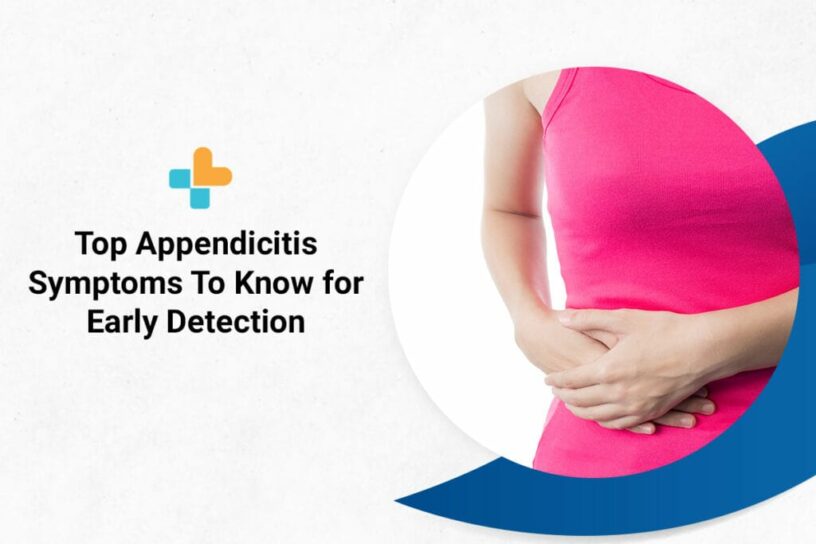Appendicitis is a serious medical condition that can lead to life-threatening complications if left untreated. Recognizing appendicitis symptoms early can push you to seek immediate medical attention.
In this blog post, we’ll explore what appendicitis is, what causes appendicitis, and the four stages of appendicitis symptoms. With this knowledge, you should be able to recognize the danger signs and take prompt action.
Let’s dive in.
What Is Appendicitis and What Are Its Symptoms?
Appendicitis affects the appendix, a small organ located near the large intestine. If left untreated, it can result in more serious complications.
It occurs when the appendix becomes inflamed. The causes vary, but it may happen as a result of childbirth (postpartum infections) and excessive eating.
If you experience any of the following signs and symptoms, seek medical attention as soon as possible:
- Severe pain in the lower abdomen, nausea, and vomiting.
- Fever above 38°C (100°F).
- Difficulty breathing, loss of appetite, lightheadedness, or dizziness.
- Bleeding from the bowels or an inability to have bowel movements.
In some cases — especially in patients with conditions like diabetes or cirrhosis — appendicitis may not show any obvious symptoms at all until it’s too late.
Who Does Appendicitis Affect?
Typically, appendicitis affects people aged 10–30, but it can affect anyone at any age. Risk factors for appendicitis include having a family history of the condition, being immunocompromised, having a certain lifestyle or diet, obesity, and smoking.
However, even people without these risk factors can develop appendicitis if they experience repeated constipation, a bowel obstruction from faecal matter, infection, or inflammation.
What Are the 4 Stages of Appendicitis Symptoms?
Appendicitis is a condition in which the appendix becomes inflamed and causes pain in the area around it.
Each stage has its own set of warning signs that you should take seriously. In general, you should take abdominal pain seriously and seek prompt medical attention.
Here’s an outline of the four stages of appendicitis symptoms:
- Stage 1 (less than 24 hours after becoming ill): Appendicitis starts with very mild symptoms like bloating and slight stomach pain. This stage is also known as the prodrome stage, and it lasts for about 1–2 days.
- Stage 2 (24–72 hours after becoming ill): You may have more severe stomach pain, which can radiate to your lower back, in addition to nausea, vomiting, and diarrhoea.
- Stage 3 (more than 72 hours after becoming ill): The pain is more intense than in Stage II, and it’s usually accompanied by fever and chills. Nausea, constipation or diarrhoea becomes more common.
- Stage 4 (when the appendix has ruptured): You may experience intense abdominal pain.
When Should You Seek Medical Help for Appendicitis Symptoms?
Appendicitis is a common disease that can lead to serious health problems if not treated quickly. If you experience any of the symptoms discussed above, it is important to seek medical help right away.
If you cannot make it to the hospital immediately, try to call your doctor or emergency room as soon as possible. While these symptoms may seem mild at first, they could indicate more serious conditions such as appendicitis.
By getting early treatment for appendicitis symptoms, you could avoid long-term health complications such as intestinal obstruction or peritonitis.
How Can You Prevent Appendicitis?
Appendicitis can be prevented by eating a balanced diet and exercising regularly. Not only will this help prevent obesity or other health problems down the line, but it will also help reduce your risk of developing an intestinal tract infection in the first place.
How Is Appendicitis Treated?
If you develop appendicitis — no matter the cause — know that treatments range from antibiotics to surgery, depending on the situation. So take care of yourself and remember: Early detection is key!
- Appendicitis can be detected early on by a doctor using tests such as an ultrasound or CT scan.
- Treatment options may include antibiotics to decrease inflammation and stop the infection from spreading, surgery to remove the appendix if it is inflamed and causing pain or obstruction in other parts of the body, or radiation therapy directed at cancer cells in nearby organs (such as the appendix).
If the appendicitis doesn’t respond to treatment within a few days after being diagnosed, additional measures may be necessary, such as surgery to remove part of your large intestine (ileostomy) to allow better flow of faecal matter through your system.
How Can I Get Help if I Display Appendicitis Symptoms?
It is clear from our discussion that appendicitis is a serious condition that can lead to serious complications if not treated promptly.
Before we conclude, we want to remind you that if you live in Bangalore, Chandigarh, Jaipur, NCR, and Hyderabad, you can visit Ayu Health’s NABH-accredited diagnostic centres.
They offer the following advantages:
- Packages with 100% fixed prices.
- Affordable prices, easy payment options, 0% EMI.
- Complete insurance support.
Visit their website or call +91 636-6100-800 today to book an appointment.
Our Hospital Locations
General Surgery Hospitals in Chandigarh | General Surgery Hospitals in Bangalore | General Surgery Hospitals in Jaipur | General Surgery Hospitals in NCR | General Surgery Hospitals in Hyderabad
Our Doctors
General Surgery Doctors in Chandigarh | General Surgery Doctors in Bangalore | General Surgery Doctors in Jaipur | General Surgery Doctors in NCR | General Surgery Doctors in Hyderabad




